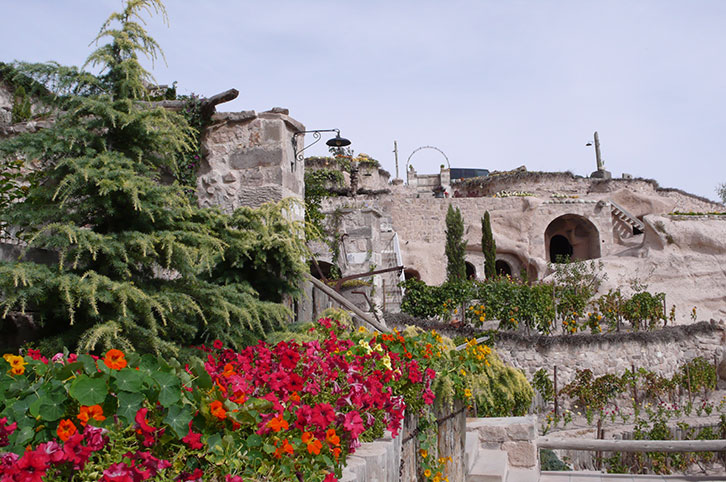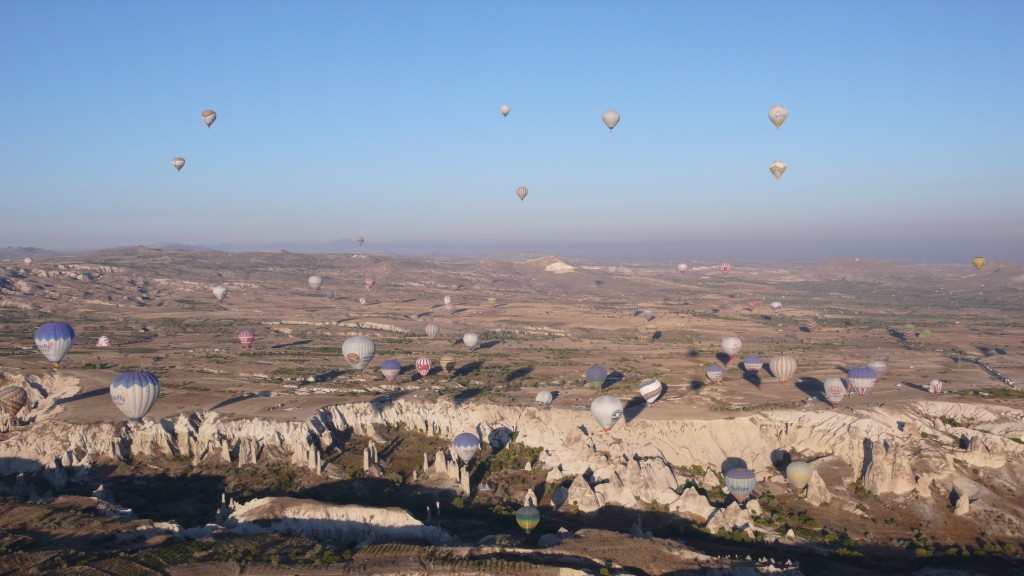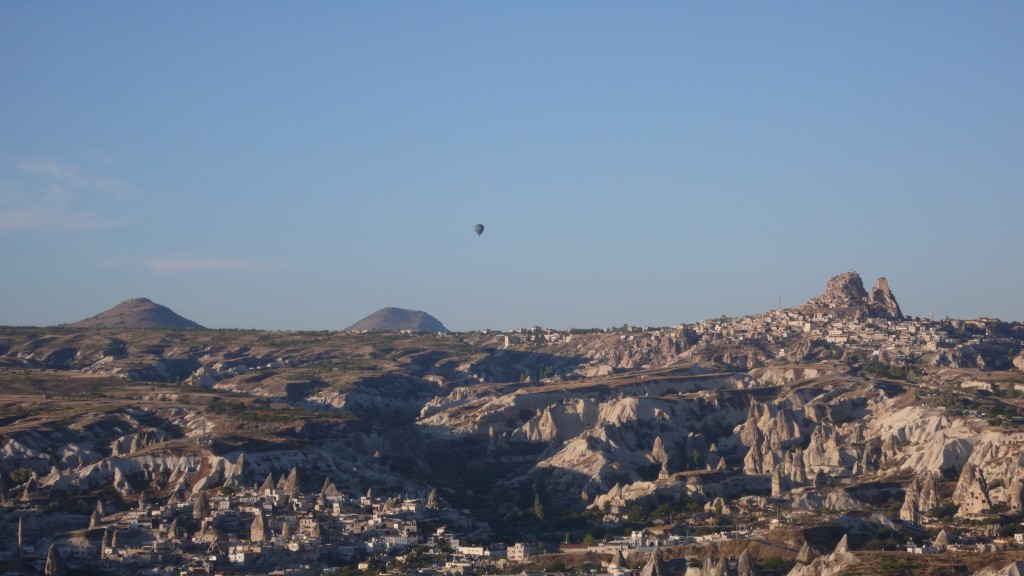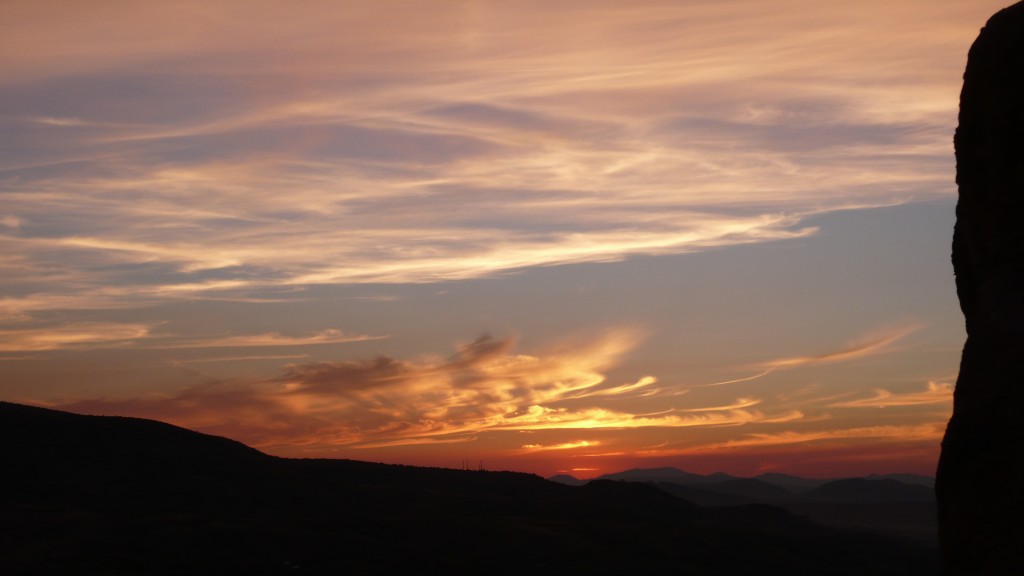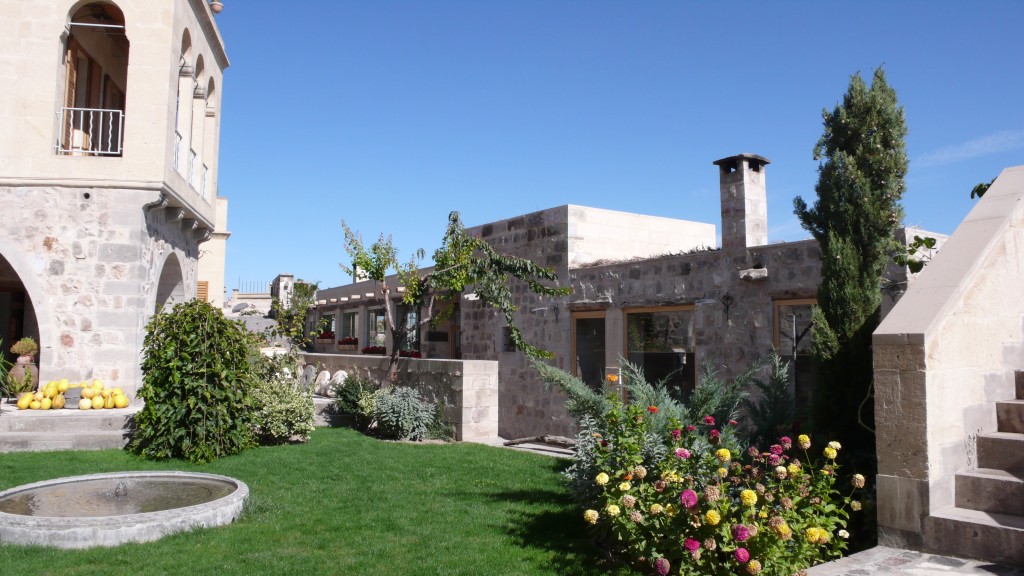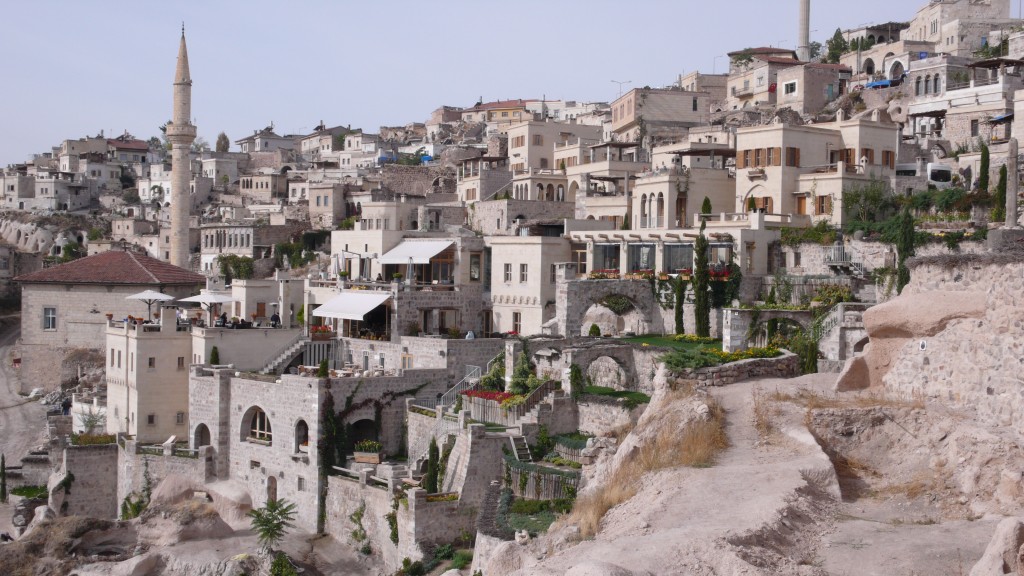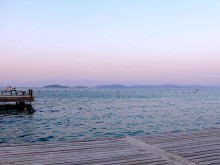Years ago, as an adolescent, I learned the word “Shangri-La” and subsequently sought out the 1933 James Hilton novel, “Lost Horizon,” where a group of world-weary travelers arrive at a mystical lamasery, a mythical utopia marked by harmony and happiness.
Time passes, and you get older, and you learn to search for “Shangri-La” in your daily life – until late one night, you arrive at Argos in Cappadocia in the mountains of Turkey. When you awaken in the morning, as the sun glides up from the horizon revealing a landscape marked by fairy chimneys, minarets, vineyards, orchards, and scores of hot air balloons floating in the peaceful blue sky, you realize that here, at last, you have found what you first learned about when you were but a lad. Here it is; here is Shangri-La: heaven on a hilltop in Cappadocia, Turkey.
Located in the ancient region of Central Anatolia, Cappadocia is a topographical wonderland with a spectacular, lunar-like landscape marked by 6th-century monasteries and churches, cave dwellings, and stone mansions, all connected by a labyrinth of tunnels carved into the volcanic lava and ash that shaped the land nearly 65 million years ago. It’s no wonder that the monks were awed into a state of reverence.
Also known as “hoodoos,” fairy chimneys are tall, thin spires of rock, which were formed by volcanic eruptions and which, truth be told, look remarkably phallic with their mushroom cap heads. As our pilot explained with a smirk, one entire gorge is known to the locals as “Love Valley” specifically because of its uncanny resemblance to a canyon of tumescence.
Cappadocia, which means “land of the beautiful horses” in Persian, is an easy hour-long flight from Istanbul to Nevsehir. Rising on the horizon, the snow-capped Mount Erciyes (or Argaeos to the Greeks), is a beacon of white in an extraordinary landscape. From the mountain’s summit, it’s possible to see both the Black Sea and the Mediterranean Sea.
Apart from ballooning, tourists making the trek to Cappadocia explore open-air museums that feature rock-hewn chapels, monasteries, and pigeon houses. More than forty underground cities from the Bronze Age have been identified, including one where thousands of Christians hid from the Romans on seven subterranean levels. Thermal springs in the lake region of Acigol are heralded for their salutary impact on skin conditions and eye problems.
Thanks to the mineral-rich volcanic soil and the plethora of caves serving as wine cellars, Cappadocia has become Turkey’s primary wine-making region. Wine tasting tours reveal wines that reveal a pleasing complexity befitting their provenance: Cappadocia has been making wine since at least 4000 B.C. and, according to Herodotus, Bacchus was born in western Turkey.
A center of terra cotta art since 2,000 BC, Cappadocia has a deep and abiding appreciation for craftsmanship. Pottery workshops alongside a master potter heighten your appreciation for the ancient artifacts you glimpse in niches throughout the region.
If you hike up Uchisar Castle at gloaming, you’ll find yourself waiting for the sunset with dozens of locals and tourists. An incredible panorama of peaks, cones, and obelisks dot the foreground, with Mount Erciyes in the distance, and when the sun slips below the horizon, igniting the sky with streaks of orange, the crowd cheers.
Before you descend from atop the citadel, pause and gaze over Pigeon Valley at the monumental landscape produced by the three distant volcanic mountains. You are standing at the highest point in Cappadocia.
From this perspective, it’s possible that you might find the peace that comes from knowing that millions of years of history have preceded your arrival here – and that you are but another speck in the passage of humanity across the landscape of time.
Argos in Cappadocia: If you are fortunate in this life, once in a while you awaken in a place that restores your sense of wonder – and reminds you how miraculous this planet can be.
High in the volcanic mountains in the highest town in Cappadocia, Turkey, there exists a mystical village as wondrous as Brigadoon or Shangri-La – and in this town called Uchisar there exists a neighborhood of nearly twenty buildings that goes by the name of Argos in Cappadocia. Built from the ruins of ancient cave dwellings, stone mansions, labyrinthine tunnels, and a monastery, Argos in Cappadocia is the vision of Goksin Ilicali who first visited Uchisar in 1996 and who has spent the past sixteen years transforming the neighborhood into an “ancient village with a reception desk.”
On your first morning at Argos in Cappadocia, you will awaken to the early morning call to prayer – but it’s likely that you’ll remain in the luxurious bed as your eyes adjust to the wonder of your surroundings. Argos, you might remember, was one of the oldest cities in the Peloponnese of ancient Greece at a time when the word signified an agricultural plain.
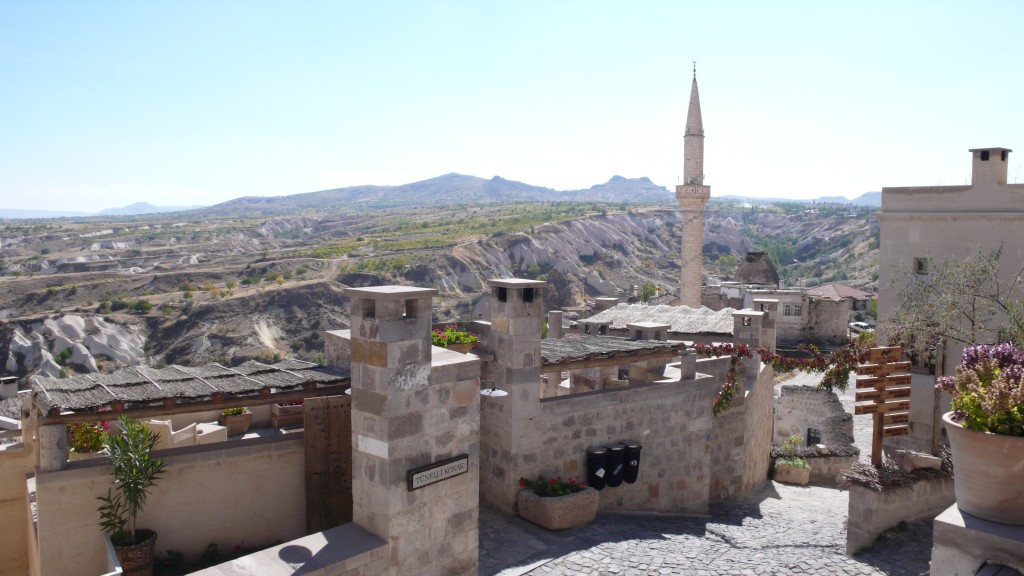
The entire property at Argos in Cappadocia is almost like an Escher staircase where every set of stairs leads to an entirely new and different perspective. (Source: MRNY)
Currently, there are 42 rooms at Argos in Cappadocia, located in four different mansions and the 2,000-year-old monastery. All rooms are furnished in a style defined by the interior designer as “rustic luxury.” What that means is that iPods and docking stations coexist with ancient museum quality artifacts displayed in niches within your own room. Lighting is provided by contemporary fixtures – and working fireplaces.
If you are residing in one of the four splendid suites with a private plunge pool inside the suite, you’ll no doubt slip into the water – and marvel at the cave dwelling in which you are living so luxuriously. Comfy armchairs and sleek sofas are amalgams of high design and rustic materials, complemented by antique Turkish carpets. Bathrooms are spacious marble sanctuaries. Each room or suite at Argos in Cappadocia feels a part of a well-curated mountain lodge and the overall design inspires contemplation and relaxation.
The entire property at Argos in Cappadocia is almost like an Escher staircase where every set of stairs leads to an entirely new and different perspective, often with stunning vistas of Mount Erciyes. As you climb and walk you think you know where you’re going, but instead, you end up on another newly-discovered terrace or under a pergola or over a bridge or beneath an arcade lined with geraniums, zinnias, and hanging chains of sun-dried tomatoes.
To bring his vision to fruition, Ilicali traveled the world, seeking hotels and accommodations that provided a sui generis experience, something that transcended the expectations generated by a website or photography.
An ongoing restoration project that features the work of some of Turkey’s most visionary architects, Argos in Cappadocia boasts an ancient caravansary and a deep, well-stocked wine cellar with a tunnel that connects two of the mansions and extends throughout much of the village. Vineyards have been planted with Muscat grapes and Argos in Cappadocia will soon make its own ice wine.
Terraced gardens are planted with arugula and tomatoes – and, in summer and autumn, geraniums, zinnias, roses and mums burst forth from sunny courtyards and pathways in a profusion of jewel colors.
An ancient cave that once served as a chapel, a caravansary, and an oil factory is blessed with remarkable acoustics, thanks to dome ceilings that rise to 32 feet, making it perfect for concerts, art exhibitions, and special events. Room service is 24 hours, as is concierge service, and wireless Internet works like a hotline to the world beyond.
Regardless of where you wander at Argos in Cappadocia, you feel the sanctity of place and the regard for space – and, almost inevitably, you slip into an enchanted state of peacefulness, whereby the cares of the temporal world are a lifetime away.
LINK: Argos in Cappadocia
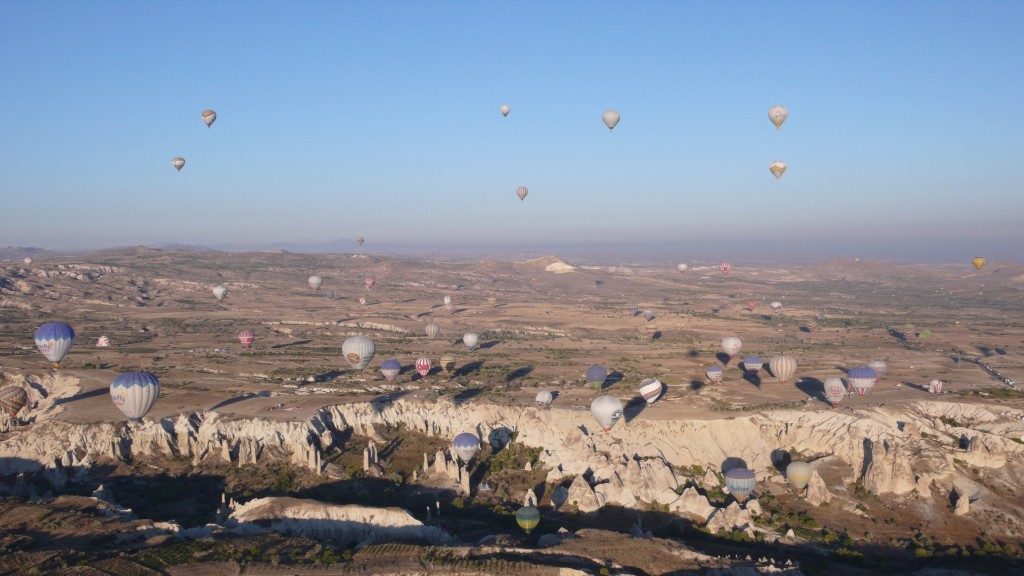
Pilots at Royal are some of the most experienced (and friendly) in all of Cappadocia. (Source: MRNY)
Hot Air Ballooning: According to many hot-air ballooning enthusiasts, there are three top ballooning locales in the world: the Loire Valley (for the chateaux), Kenya (for the wild animals), and Cappadocia for the extraordinary volcanic landscape of fairy chimneys: the tall, ancient pillars and minaret-like towers that have been carved into the stone by nature over the course of millions of years.
Ballooning in Cappadocia takes place in the early hours of day, just before sunrise, which makes for splendid aerial photographs one thousand feet above ground.
Royal Balloon offers a buffet breakfast, as well as a champagne toast at the sixty-minute ride’s conclusion. Pilots at Royal are some of the most experienced (and friendly) in all of Cappadocia, which is perhaps one good reason why Royal Balloon is the top-rated balloon company on TripAdvisor.
As you lift into the sky and sail over the deep canyons in an open basket that holds a maximum of twenty people, it’s possible that you’ll think anew of the Wizard – and understand the joys of floating over Oz.
LINK: Royal Balloon
Gallery Cappadocia: No trip to Turkey is complete without a trip to a carpet gallery. At the Gallery Cappadocia in Goreme, five female weavers work quietly and assiduously, in front of looms.
With pride and childlike wonder, the owner demonstrates the miraculous process by which silk thread materializes from the cocoons of mulberry silkworms.
In a vast showroom, scores of silk carpets sail through the air before landing on the floor in a gorgeous mosaic.
You’ll be forgiven if you faint in a paroxysm of ecstasy – and you’ll certainly wish you could ship home at least ten of your favorites.
LINK: Gallery Cappadocia
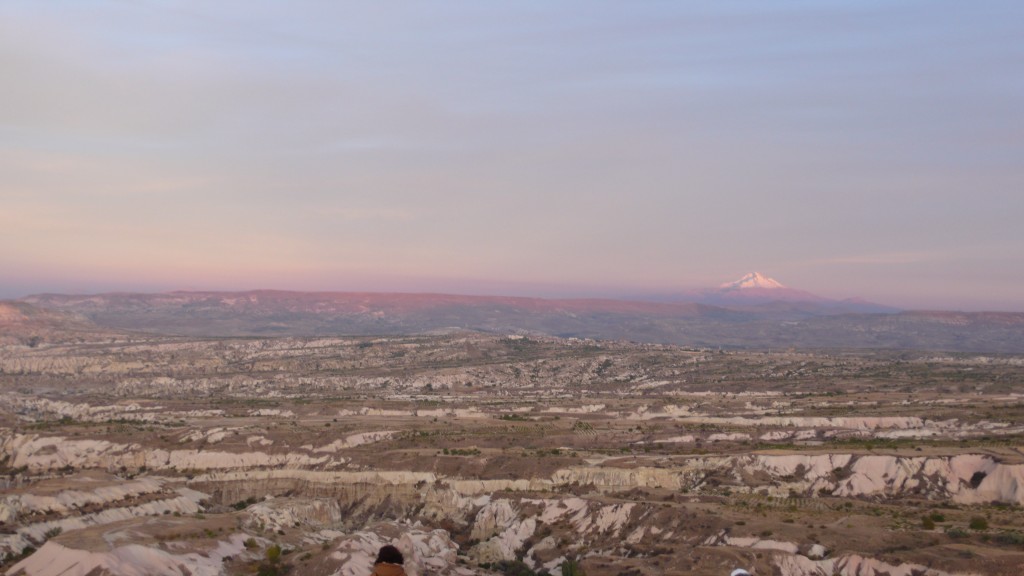
The snow-capped Mount Erciyes (or Argaeos to the Greeks), is a beacon of white in an extraordinary landscape. (Source: MRNY)
WHERE TO EAT:
Seki Restaurant @ Argos in Cappadocia: With terraces overlooking Pigeon Valley, Seki Restaurant offers one of the most mystical views of Mount Erciyes in all of Cappadocia. The all-day restaurant serves a bountiful breakfast buffet that features local ingredients such as garden-fresh arugula and fresh honey still in the comb.
Dinners at Seki are gastronomic journeys, which might include trout pastrami with aniseed melon, zucchini carpaccio with Parmesan and arugula, and lamb cutlet with grape molasses.
A traditional Turkish dessert of quince and clotted cream is a reminder of how close you are to heaven when dining at this celestial aerie.
LINK: Seki Restaurant @ Argos in Cappadocia
Lil’a @ the Museum Hotel: In the relaxed and amiable village of Uchisar, Lil’a at the Museum Hotel enables visitors the opportunity to dine in a restaurant that is as elegant as its service is polished. The winner of numerous awards for classical and modern Turkish cuisine, Lil’a affords its patrons a journey through Anatolian and Ottoman cuisine.
Lil’a’s chef, Mustafa Buyukhan, prepares a broad swath of Turkish favorites, often utilizing organic vegetables that are grown in the hotel’s garden.
Dining at Lil’a offers guests a particularly romantic atmosphere in a room that is furnished with museum-quality Turkish antiques. The combination of panoramic vistas and white-glove service makes Lil’a a celebratory destination for both locals and visitors.
For those diners who yearn for more, Lil’a offers cooking classes with Chef Buyukhan – at the conclusion of which patrons join the chef at their own chef’s table.
LINK: Lil’a @ the Museum Hotel
Gul Konaklari Sinasos: Nestled in the village of Mustafapasa, a former bastion of Greek Orthodox families, Gul Konaklari Sinasos (Rose Mansions Sinasos) consists of three restored Greek mansions. Recipes are based on the traditions of the region, including a vegetable stew cooked in a clay pot. The pot is split open with a whack from an axe as the fragrance of homemade cuisine permeates the air. Gul Konaklari Sinasos evokes the best of your grandmother’s cooking – with a side order of loving hospitality.
LINK: Gul Konaklari (Rose Mansions) Sinasos
Elai: Located at the base of Uchisar Castle, the open-air roof terrace of this restaurant overlooks Pigeon Valley – but it’s not only the stunning views that make Elai so appealing. Built into a cave with a balcony and 13-foot ceilings, Elai serves both French and Turkish cuisine in an atmosphere that evokes an ancient castle from the Middle Ages. A local favorite, Elai provides a glimpse of quotidian Turkish life in the village of Uchisar.
LINK: Elai Restaurant
GETTING THERE:
Turkish Airlines: Traveling to and from Turkey on Turkish Airlines makes you yearn for a state-owned airlines in the United States. Alongside the stewards waiting to greet you as you enter the plane is the chef in full whites – and right away you realize that this isn’t going to be one of those boxed meal flights.
Traveling Comfort Class on Turkish Airlines is the equivalent of an eight-hour vacation in the sky. Passengers are welcomed with aperitifs and Turkish mezze, as well as hazelnuts. You sink into your plush leather seat with a sigh of relief. All seats in Comfort Class offer a 46-inch seat pitch, with a 19.5-inch seat cushion. Comfort Class seats fully recline, with adjustable leg rests and personal 10.6-inch entertainment monitors that offer more than 400 entertainment options.
Meals in Comfort Class are served on porcelain china, with stainless steel cutlery and linen napkins. A recent international flight featured menu options such as a potpourri of mezze, green salad with tomatoes and Parmesan, grilled fillet of salmon with potato puree and fried zucchini, cheeses and fresh fruit, and homemade apple strudel with whipped cream. And in a nod to Turkish hospitality, the chef reappears, offering his passengers a selection from a fresh bread basket. Breakfast includes a tomato and cheese omelette with fresh fruit salad.
Employees on Turkish Airlines are as gracious as Emily Post would have wished for and after a flight on Turkish Airlines, you understand why Skytrax awarded them “Best Airline in Europe” for 2012.
LINK: Turkish Airlines

